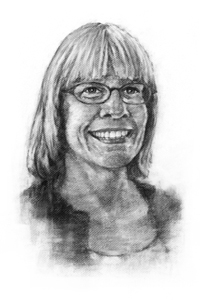Divine interpretation
llustration by Allan Burch

Name: Margaret M. Mitchell
Title:Since July 1, dean of the Divinity School; professor of New Testament and Early Christian Literature
Degrees: BA’78, Manhattanville College; AM’82, PhD’89 (Divinity School), University of Chicago
Previous post: Instructor, McCormick Theological Seminary
Books: Four, including the forthcoming Paul, the Corinthians and the Birth of Christian Hermeneutics (Cambridge University Press)
Guggenheim fellowship: I drew on 18 homilies by [John] Chrysostom that are on passages in the Pauline letters, but they’re outside what we call the kind of serial homily sets. … They’re lively. They raise some interesting issues about both his preaching and his art as an interpreter, and the context of the late fourth century. Chrysostom is really important because he has the largest extant remains of any Greek commentator on the New Testament, and so for anyone who’s interested in the history of not only interpretation of the Bible, but also the reception and reuse of the Bible, Chrysostom is a hugely important figure.
Guiding the Div School: We train students to be able to speak about religion in a manner that is informed and critical and reasoned and respectful, but unflinchingly honest about what the evidence is. And this is what I, as a scholar and educator, take to be my vocation. I think that what our divinity school represents is a place where there just aren’t sacred cows; there aren’t untouchable subjects. There are not assumptions that can go without defense in any argument or discussion about religion. And my own sense is that this is a rare commodity.
How she found religion: I went to college to study English, and I took, really by accident, an Introduction to the Old Testament. And I was just astonished about the literary history. I hadn’t actually read the Bible. Catholics don’t really read the Bible except within church, and there it’s all chopped up in pieces for the lectionary. And I was just astounded by the fact that biblical literature had this history behind it, that it wasn’t written in the order in which you find it, sort of the basic issues of introduction to this literature—learning a few Hebrew words and what the nuances were of these terms.
[After that] there was no looking back for me. I couldn’t learn enough. And that extended to anything about ancient religion, so ancient Roman burials, or Greek mystery cults, or early Christian writings about baptism, or whatever; I just became fascinated by the subject of ancient religion and biblical literature in particular.
Unfinished business:One of the best teachers I ever had was in college, and when I asked her for advice when I went off to teach high school, she said, “Don’t present your students with a world that is finished, with a world that is completed.” And I think that’s true whether you’re teaching high school, or ministry students in a seminary, or students at the University of Chicago Divinity School.
